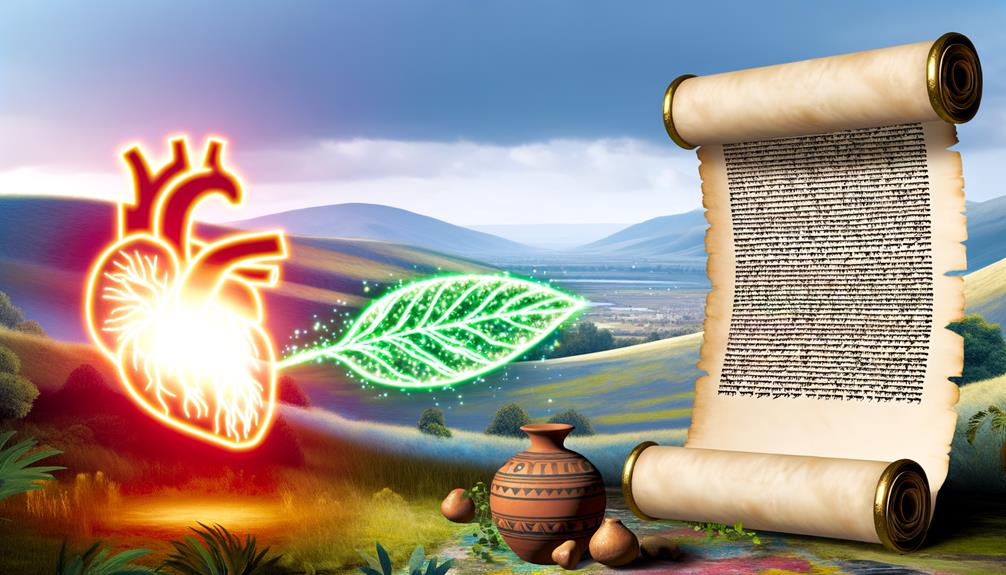Gift of Life Meaning Bible: Creation and Blessing
The ‘Gift of Life‘ in the Bible signifies life as a sacred and divine endowment from God, grounded in ancient Judaic traditions and highlighted in the creation narrative of Genesis 2:7. This concept emphasizes life’s intrinsic value, intentional creation, and ongoing divine engagement.
Key themes include the sanctity of human life (Imago Dei), the promise of eternal life through faith (John 3:16 and Romans 6:23), and the moral responsibilities stemming from life’s sacred nature. Biblical texts and annotations deepen this understanding, providing insights into life’s profound spiritual dimensions and the importance of reverence, ethical living, and transformative communion with God.
Explore to uncover further layers of this profound concept.

Gift of Life Meaning in the Bible: Symbolism of Grace, Salvation, and Eternal Life
| Aspect | Biblical Meaning |
|---|---|
| Divine Grace | The “gift of life” refers to God’s divine grace, freely given to humanity, offering the blessing of existence and the opportunity for eternal life. |
| Salvation Through Christ | Life is viewed as a gift from God, and eternal life is made possible through salvation in Jesus Christ, emphasizing the significance of Jesus’ sacrifice. |
| Stewardship & Purpose | The gift of life also includes the responsibility of stewardship, where individuals are called to live according to God’s purpose and His will. |
| Eternal Life | The ultimate gift of life in the Bible is eternal life, promised to those who believe in and follow Jesus Christ. |
| Thankfulness & Humility | Emphasizes the need for gratitude, recognizing that life itself is a precious gift from God that should be cherished and used for good. |
Historical Background

The historical background of the phrase ‘Gift of Life‘ in the Bible is deeply rooted in the ancient Judaic traditions and texts that predate the Christian era.
Central to Judaic theology is the concept of life as a divine endowment from Yahweh, the Creator. This notion permeates early scriptural narratives such as the Creation account in Genesis, where God breathes life into Adam (Genesis 2:7).
Life, seen as a sacred and precious gift, underscores numerous commandments and ethical teachings found in the Torah. The Psalms and Wisdom literature further elaborate on life’s sanctity, portraying it as a divine blessing and a manifestation of God’s ongoing providence.
Consequently, the Judaic antecedents provide a foundational framework for understanding the biblical ‘Gift of Life.’
Unique Features

The exploration of the Bible’s unique features reveals several integral aspects that enhance its accessibility and depth of understanding.
Personalized cover designs offer an individualized touch, making the sacred text more relatable to modern readers.
Additionally, high-quality print and thorough study guides guarantee that the theological and historical complexities are presented with clarity and scholarly rigor.
Personalized Cover Designs
Frequently, personalized cover designs for Bibles incorporate unique features that reflect the profound spiritual significance of the ‘Gift of Life‘ concept.
These covers often utilize symbolic imagery, such as the Tree of Life or a radiant cross, to evoke themes of renewal and divine grace.
Additionally, the use of high-quality materials like leather or linen enhances the tactile experience, making the Bible not only a sacred text but also a cherished keepsake.
Intricate embossing and metallic accents may further augment the aesthetic appeal, creating a visually compelling representation of faith.
Customization options, including engraved names or dates, imbue the cover with personal meaning, thereby deepening the spiritual connection for the individual.
High-Quality Print
Often overlooked, the high-quality print of a Bible greatly enhances its readability and longevity, reflecting the reverence with which the sacred text is regarded.
Utilizing advanced printing technologies, these Bibles are often crafted with sharp, clear fonts and ideal spacing, facilitating an engaging reading experience.
High-quality paper, typically acid-free, guarantees durability and prevents deterioration over time, preserving the scripture for future generations.
In addition, the ink used is often fade-resistant, maintaining the integrity of the text even after extensive use.
This meticulous attention to detail underscores the significance attributed to the Bible, as a vessel of divine wisdom.
Consequently, high-quality print serves not only a functional purpose but also honors the sanctity of the message contained within.
Comprehensive Study Guides
Beyond the meticulous craftsmanship of high-quality print, extensive study guides embedded within many Bibles offer an unparalleled depth of understanding through unique features tailored to elucidate the text’s profound meanings.
These guides often include detailed cross-referencing systems that connect related passages, facilitating a holistic grasp of scriptural themes. Annotated commentaries provide historical context and theological insights, enhancing comprehension of complex doctrines.
Additionally, word studies explore the original Hebrew, Aramaic, and Greek languages, revealing nuanced interpretations lost in translation. Visual aids, such as maps and charts, contextualize biblical events geographically and chronologically.
Together, these features create an immersive educational experience, empowering readers to explore the Bible’s spiritual and intellectual dimensions with greater precision and depth.
Key Themes

In exploring the key themes surrounding the ‘Gift of Life‘ in the Bible, one must consider the profound significance attributed to divine creation, the promise of eternal life, and the inherent sacredness of human existence.
These themes collectively underscore a theological framework that elevates life as a divine endowment, meriting profound respect and reverence.
Analyzing these points provides a thorough understanding of how biblical texts interpret the essence and purpose of life within a spiritual context.
Divine Creation Significance
How does the Bible’s portrayal of divine creation underscore the profound significance of life as a sacred gift from God?
The biblical narrative of creation, particularly in Genesis, illustrates life as an intentional and divine act. God’s formation of humanity from dust and breathing life into Adam signifies not just the physical but also the spiritual essence of life. This act of creation conveys an intrinsic value and purpose, positioning life as inherently sacred.
Additionally, the recurring biblical theme of God’s ongoing creative power reflects a continuous divine engagement with humanity. By portraying life as a deliberate gift from God, the Bible emphasizes human existence as fundamentally precious and imbued with divine purpose, thereby inviting a deeper reverence for life’s sanctity.
Eternal Life Promise
The concept of eternal life in the Bible is intricately woven into its theological framework, symbolizing not merely an unending existence but a profound, transformative communion with God.
This promise is foundational, encapsulating the essence of divine grace and salvation offered through faith in Jesus Christ.
Biblical texts, such as John 3:16 and Romans 6:23, underscore eternal life as a gift transcending temporal limitations, pivoting on a relationship with the Divine.
The Johannine literature particularly emphasizes knowing God and Jesus as the pathway to eternal life, suggesting a quality of existence imbued with divine presence and purpose.
Consequently, eternal life in biblical terms is not only future-oriented but is also an experiential reality commencing in the present.
Human Life Sacredness
Central to biblical anthropology is the notion that human life is imbued with inherent sacredness, reflecting the imago Dei—the image of God—in which humanity is created. This theological concept underscores several key themes:
Intrinsic Value: Every human being possesses inherent worth and dignity, independent of societal status or achievements.
Moral Responsibility: Since humans reflect God’s image, they are called to uphold ethical standards and justice.
Sanctity of Life: The Bible mandates the protection and preservation of human life, opposing acts that devalue or harm it.
The sacredness of human life, as articulated in Scripture, provides a foundational ethic that influences moral, social, and legal dimensions within Judeo-Christian contexts, affirming the profound respect owed to every individual.
Notable Annotations

Examining notable annotations within biblical texts reveals profound insights into the theological and moral dimensions of the concept of the ‘gift of life.’
Biblical scholars often highlight key passages, such as Genesis 2:7, where God breathes life into Adam, illustrating the divine origin and sacredness of life.
Annotations on Psalm 139:13-16 further emphasize the intimate knowledge and intentionality of God in the creation of each individual.
Additionally, New Scripture references, particularly John 10:10, underscore the abundant life offered through Christ.
These annotations collectively underscore life as a divine gift, marked by purpose and value beyond mere existence.
They invite readers to reflect on the sanctity and stewardship of life in their spiritual and moral conduct.
Reader Testimonials

Numerous reader testimonials provide a rich tapestry of personal experiences and reflections, illustrating the profound impact that the biblical concept of the ‘gift of life’ has on individuals’ faith and daily lives.
These testimonials reveal how deeply the scriptures resonate, shaping believers’ understanding and actions.
Analyzing these narratives, three key themes emerge:
- Transformation: Many readers recount life-changing experiences prompted by their engagement with the biblical text.
- Renewed Purpose: Testimonials often highlight a newfound sense of purpose, driven by the divine gift of life.
- Strength in Adversity: Numerous accounts describe how scriptural insights provide strength and solace during challenging times.
This convergence of personal testimony underscores the enduring relevance and spiritual potency of biblical teachings.
Daily Reflections

Building on these personal narratives, daily reflections offer a structured approach to internalizing the biblical concept of the ‘gift of life’, encouraging ongoing spiritual growth and introspection.
These reflections serve as a disciplined practice, allowing individuals to meditate on scriptural teachings and their meanings in a contemporary context.
By engaging with the Bible daily, believers can explore the depth of divine wisdom, enhancing their understanding and appreciation of life as a sacred gift.
This continual engagement fosters a deeper connection with the divine, promoting ethical living and personal transformation.
Through reflective practice, the abstract becomes tangible, guiding adherents in their daily lives and reinforcing the profound value of each moment granted by the Creator.
Study Tips

Effective study tips can greatly enhance one’s ability to understand and internalize the biblical teachings on the ‘gift of life’. To cultivate a deeper comprehension, consider the following strategies:
- Contextual Reading: Analyze the historical, cultural, and theological context of the passages. Understanding the environment in which the text was written can illuminate its deeper meanings.
- Lexical Study: Investigate key terms in their original languages (Hebrew, Greek, Aramaic). This can reveal nuances lost in translation and provide richer insights.
- Cross-Referencing: Compare and contrast related scriptures. This method allows for a holistic understanding, revealing how different parts of the Bible interconnect to convey a unified message about the ‘gift of life.’
These techniques foster a rigorous and enriched biblical study experience.
Where to Buy

For those seeking to deepen their understanding of the biblical ‘gift of life‘ through literature and resources, it is essential to identify reputable sources for purchasing relevant materials.
Renowned Christian bookstores, such as Lifeway and Christianbook.com, offer a wide selection of Bibles, commentaries, and study guides. Additionally, online platforms like Amazon provide user reviews that can assist in discerning the quality and relevance of specific texts.
Academic publishers, including Zondervan and InterVarsity Press, supply scholarly works that explore theological interpretations. For those preferring physical stores, local religious bookstores and church libraries often curate specialized collections.
Ensuring that these resources are sourced from credible vendors guarantees the acquisition of accurate and enriching biblical insights.
Conclusion
The concept of the ‘gift of life‘ in the Bible encompasses profound theological implications, spanning historical context and unique scriptural features.
A notable statistic reveals that the phrase ‘gift of God’ appears 42 times in various forms throughout the Bible, underscoring the recurrent theme of divine benevolence. Understanding the gift of God is central to the beliefs of many religions, and these mentions in the Bible serve as a reminder of the importance of gratitude and receiving blessings with humility. The phrase ‘gift of God’ is often associated with the idea of salvation and eternal life, reinforcing the concept of God’s unconditional love and generosity towards humanity. Overall, the frequent use of this phrase in the Bible reinforces the message of divine benevolence and the significance of recognizing and appreciating the gifts that come from a higher power.
Such a frequency highlights the importance placed on life as a divine endowment.
Scholarly analysis suggests this emphasis serves to deepen the understanding of human existence within a theological framework.






